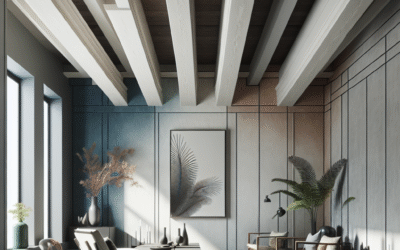
Are you tired of cluttered spaces and overwhelming designs? Japandi minimalism offers a refreshing approach to home decor—combining the calming aesthetics of Japanese design with the warmth of Scandinavian simplicity. In this article, you’ll learn how to decorate in the Japandi style, creating a serene sanctuary that promotes relaxation. With actionable insights and detailed tips, you’ll discover how to blend functionality with beauty, while embracing the philosophy of less is more.
By the end of this piece, you’ll not only understand the foundational elements of Japandi design but also possess practical steps to transform your home into a peaceful haven. Ready to dive in? Let’s explore!
Understanding the Japandi Aesthetic
The Japandi style merges the minimalist principles of Japanese design with the cozy aesthetics of Scandinavian interiors. At its core, it emphasizes simplicity, functionality, and the beauty of natural materials.
The Origins of Japandi
Japandi emerged as a response to the overwhelming clutter often found in modern design. If you value a calm, serene environment, this style speaks to you through its appreciation for craftsmanship and materials sourced from nature. Think of neutral color palettes, organic textures, and an overall uncluttered look.
Key Characteristics of Japandi Design
Japandi design is defined by:
- Neutral color schemes
- Natural materials like wood, bamboo, and linen
- Simplicity and functionality
- Incorporation of plants and greenery
- Thoughtful layout and spatial awareness
Choosing the Right Color Palette
Color plays a critical role in Japandi decor. It’s essential to select hues that exude tranquility and warmth. Here’s how to go about it:
Neutral Tones for a Calming Effect
Start with a base of whites, greys, and beiges. These tones create a backdrop that can enhance the sense of space and cleanliness.
Accent Colors to Add Warmth
Incorporate earthy shades such as terracotta, olive, or muted pastels. These accent colors should harmonize with your neutrals to create visual interest without overwhelming your surroundings.
Furniture Selection for a Japandi Home
Furniture plays a pivotal role in establishing the Japandi aesthetic. Here’s what to consider when selecting pieces:
Functional and Multi-purpose Furniture
Choose furniture that serves more than one function. For example, ottomans that double as storage or coffee tables that can extend to accommodate guests are ideal.
Low-profile Furniture
Look for furniture that sits close to the ground, like low sofas and low tables, to create a sense of spaciousness.
Important Materials
Wood is essential in Japandi furniture. Opt for pieces made from sustainable materials such as oak, teak or bamboo, which promoted longevity and connection to nature.
Integrating Textiles and Patterns
Textiles in Japandi design play a crucial role in softening spaces and adding comfort.
Natural Fibers Are Key
Use textiles made from organic materials such as cotton, linen, or wool to enhance the tactile experience of your space. These materials contribute to the overall cohesion of the design.
Patterns: Less is More
While patterns are welcomed, they should remain subtle. Think minimalist designs, like soft stripes or organic shapes that complement the natural materials.
Accessorizing Thoughtfully
In Japandi minimalism, less is truly more. Here are some guidelines for choosing accessories:
Limit Your Decor to Essentials
Choose a few statement pieces that reflect your style rather than scattering numerous small items around the space.
Add Greenery
Incorporating plants can enhance your living space while promoting mental wellbeing. Opt for simple plant arrangements in elegant pots to maintain the clean aesthetic.
Emphasizing Lighting in Japandi Design
Good lighting enhances the ambiance of a Japandi space. Here’s how to achieve it:
Natural Light
Maximize natural light by keeping window treatments minimal. Sheer curtains can soften edges while maintaining brightness.
Warm Artificial Lighting
Incorporate warm-toned light fixtures that create a cozy atmosphere at night. Use simple designs that adhere to the Japandi essence.
Case Study: A Japandi Makeover in Practice
To illustrate the principles discussed, let’s look at a real-world application.
The Transformation of a Small Apartment
A small urban apartment was transformed into a serene sanctuary by following Japandi principles. The owners opted for a neutral palette, integrated multi-functional furniture, and introduced greenery to enhance the environment.
Before and After Highlights
- Removed crowded furniture to open up the space
- Applied a fresh coat of neutral paint to walls
- Incorporated natural wooden accents
The final outcome was an aesthetically pleasing environment that promotes tranquility and relaxation.
Frequently Asked Questions (FAQ)
What is Japandi style?
Japandi style is a fusion of Japanese and Scandinavian design, emphasizing simplicity, functionality, and natural materials in home decor.
How do I start decorating in Japandi style?
Begin with a neutral color palette, select multi-functional furniture, and choose natural materials to create a calming atmosphere.
What materials to use in Japandi decor?
Natural materials like wood, stone, and textiles made from cotton or linen are preferred. These elements promote warmth and connection to nature.
Can I mix Japandi with other styles?
Yes, Japandi can be harmoniously blended with other styles like modern or industrial, as long as the focus remains on simplicity and functionality.
How do I choose the right lighting for a Japandi space?
Select warm-toned, simple designs for lighting and maximize natural light to create an inviting atmosphere.
Conclusion: Embrace the Japandi Lifestyle
Decorating your home with Japandi minimalist style not only elevates the aesthetic but also promotes a more mindful way of living. By simplifying your space, choosing natural materials, and embracing the principles of functionality, you create a sanctuary that reflects tranquility and beauty.
Ready to start your Japandi journey? Explore our related articles for more insights and inspiration. Let’s make your home a serene escape!
Content Disclaimer
The information provided in this article is for educational purposes only. It is not professional advice and should be taken as general guidance for decorating purposes. Always consult with professionals for specific design advice.
Categories
- Accent Walls & Ceilings (84)
- Art Curation & Gallery (83)
- Bedding Style Trends (89)
- Bedroom Makeover (96)
- Bohemian & Eclectic Styles (80)
- DIY & Budget-Friendly Decor (78)
- Eco-Friendly Design (83)
- Furniture Care (87)
- Home Decor & Design Ideas (181)
- Home Wellness Spaces (103)
- Integrated Outdoor Living (91)
- Japandi Style (84)
- Kids and Nursery Decor (73)
- Living Room Decor (99)
- Mix & Match Techniques (95)
- Modern & Contemporary Design (88)
- Rug Sizing & Placement (89)
- Scandinavian Design Inspiration (51)
- Seasonal Home Decor (100)
- Small Space Solutions (93)
- Wall Art & Painting Tips (94)
Recent Comments
Archives
Product Gallery
-
Majestic African Wildlife Canvas Art for Stylish Home Decor
Rated 5.00 out of 5 -
Cozy Irregular Green Plush Rug for Nordic Living Spaces
Rated 5.00 out of 5$45.53 – $287.11Price range: $45.53 through $287.11 -
Scandinavian Geometric Area Rugs for Stylish Home Décor
Rated 5.00 out of 5$34.12 – $516.89Price range: $34.12 through $516.89













